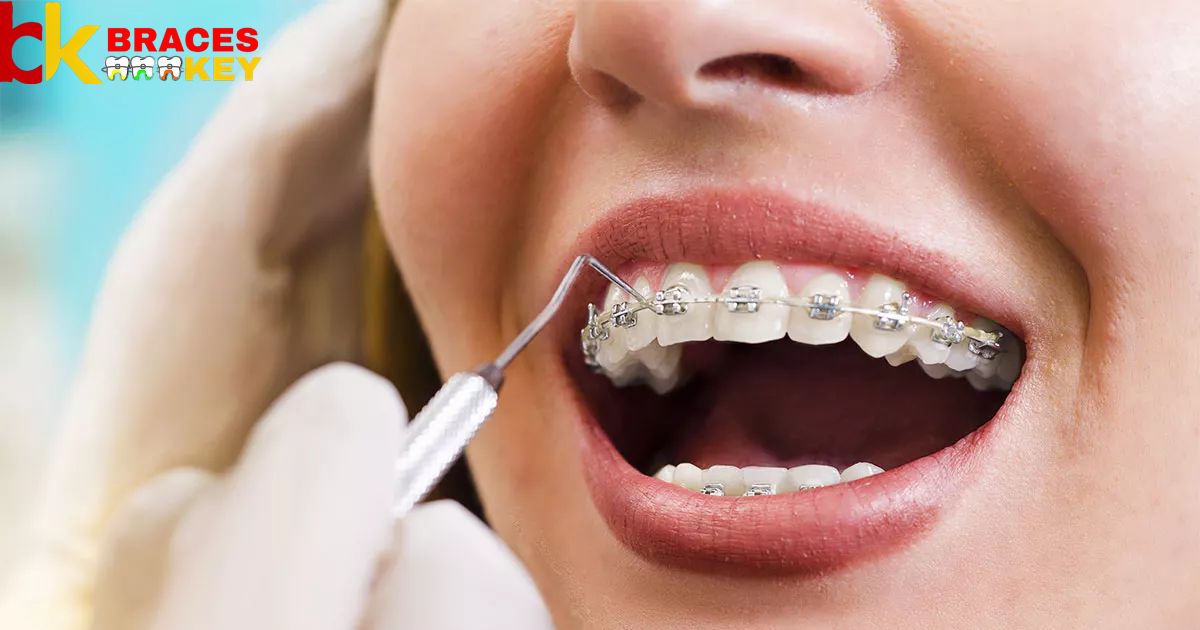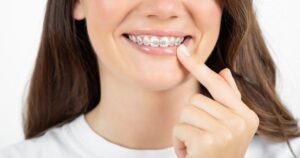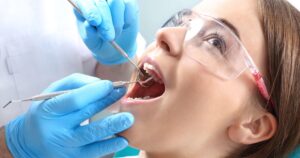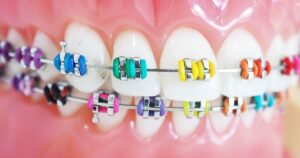When you develop a cavity while wearing braces, it can pose unique challenges. The brackets and wires can make cleaning difficult, increasing the risk of further decay. It’s crucial to maintain excellent oral hygiene, possibly with specialized tools, and consult your orthodontist to address the issue promptly.
Curious about what happens when you get a cavity with braces. Braces create a beautiful smile, but when you get a cavity with braces, it can complicate your orthodontic journey. The critical steps to maintain oral health and protect your braces while battling tooth decay. Don’t let a cavity derail your path to a perfect smile.
When you get a cavity with braces, it can be more challenging to address. Braces create additional crevices where food particles can get trapped, increasing the risk of cavities. Regular dental check-ups and diligent oral hygiene are crucial to prevent and manage cavities while undergoing orthodontic treatment.
Cavity Risks with Braces
Braces, while effective in straightening teeth, can increase the risk of cavities. The brackets and wires make it challenging to clean teeth thoroughly, leading to plaque buildup. Regular dental hygiene and check-ups are crucial to prevent cavity development during orthodontic treatment.
Understanding Cavity Formation
Understanding cavity formation is crucial in various fields, including dentistry and geology. It involves the development of voids or empty spaces within a material or structure. Researchers study the factors leading to cavity formation to improve prevention and mitigation strategies in these diverse applications.
Increased Cavity Risk with Braces
Wearing braces can elevate the risk of cavities due to the challenges in cleaning around brackets and wires. Food particles and plaque can easily accumulate, leading to tooth decay. Maintaining diligent oral hygiene and regular dental check-ups is crucial to mitigate this increased cavity risk during orthodontic treatment.
Oral Hygiene Challenges
Maintaining optimal oral hygiene can be challenging due to factors such as irregular brushing habits, poor diet choices, and neglect of dental check-ups. These challenges often lead to plaque buildup, cavities, and gum problems if left unaddressed.
Preventing Cavities While Wearing Braces
Maintaining oral hygiene becomes crucial when wearing braces to prevent cavities. Food particles easily get trapped in the brackets and wires, so regular brushing and flossing are essential. Additionally, reducing sugary snacks and drinks can help safeguard your teeth during orthodontic treatment.
Signs of a Cavity
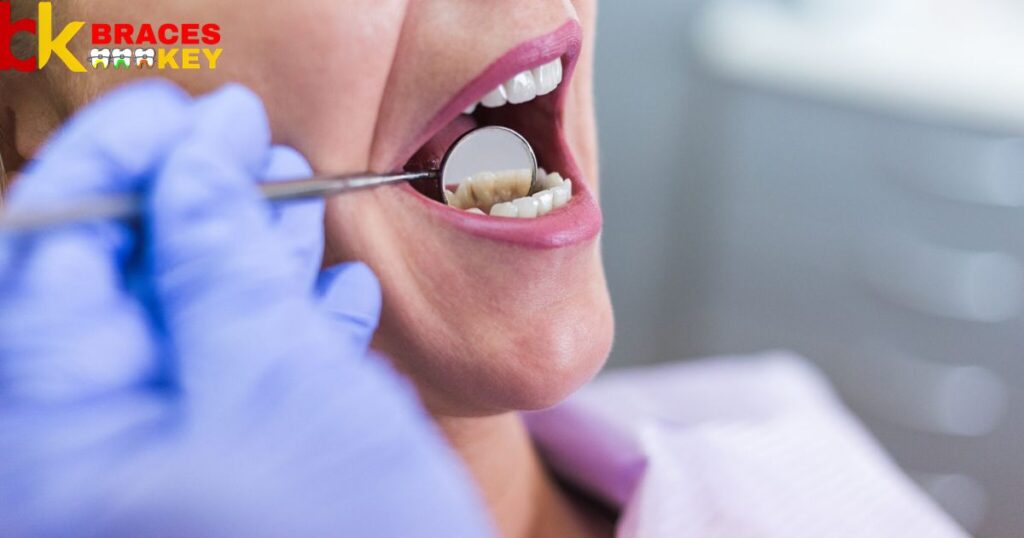
Signs of a cavity include tooth sensitivity to hot or cold temperatures, localized pain, and visible dark spots on the tooth’s surface. These early indicators often signal the need for dental attention to prevent further decay and maintain oral health. Regular dental check-ups are essential to catch cavities in their early stages.
Importance of Regular Check-Ups
Regular check-ups are crucial for maintaining good health and preventing potential illnesses. They enable early detection of health issues, leading to more effective treatments and improved outcomes. Routine medical exams also promote a proactive approach to well-being, ensuring a longer and healthier life.
Braces and Food Trapping
Braces are orthodontic devices used to align teeth, but they can occasionally trap food particles between wires and brackets. This food trapping can lead to dental issues and requires diligent oral hygiene practices to prevent problems like cavities and gum inflammation.
Managing Cavities During Orthodontic Treatment
Managing cavities during orthodontic treatment is crucial to maintain oral health. Braces can make cleaning teeth more challenging, so regular dental check-ups and diligent oral hygiene are essential. Dentists may recommend special tools and techniques to prevent cavities and ensure a healthy smile throughout orthodontic care.
Effective Brushing and Flossing Techniques
Effective brushing and flossing are essential for maintaining good oral hygiene. Brushing should involve gentle circular motions for two minutes, covering all tooth surfaces, while flossing helps remove food particles and plaque from between teeth. Regular practice of these techniques can prevent cavities and gum disease.
Dietary Adjustments for Cavity Prevention
Dietary adjustments for cavity prevention are essential for maintaining good oral health. Avoiding sugary and acidic foods, while increasing the intake of tooth-friendly options like fruits, vegetables, and dairy products, can help reduce the risk of dental cavities.
Dental Sealants for Added Protection
Dental sealants provide an extra layer of protection for your teeth. These thin, protective coatings are applied to the chewing surfaces of molars and premolars to guard against cavities and decay. They are a simple and effective way to maintain optimal oral health.
Long-Term Consequences of Cavity Development
The long-term consequences of cavity development can be significant. Untreated cavities can lead to tooth infections, gum disease, and even tooth loss. They may also result in ongoing dental expenses and discomfort, highlighting the importance of regular dental care and maintenance to prevent these issues.
Dealing with Cavities While Wearing Braces
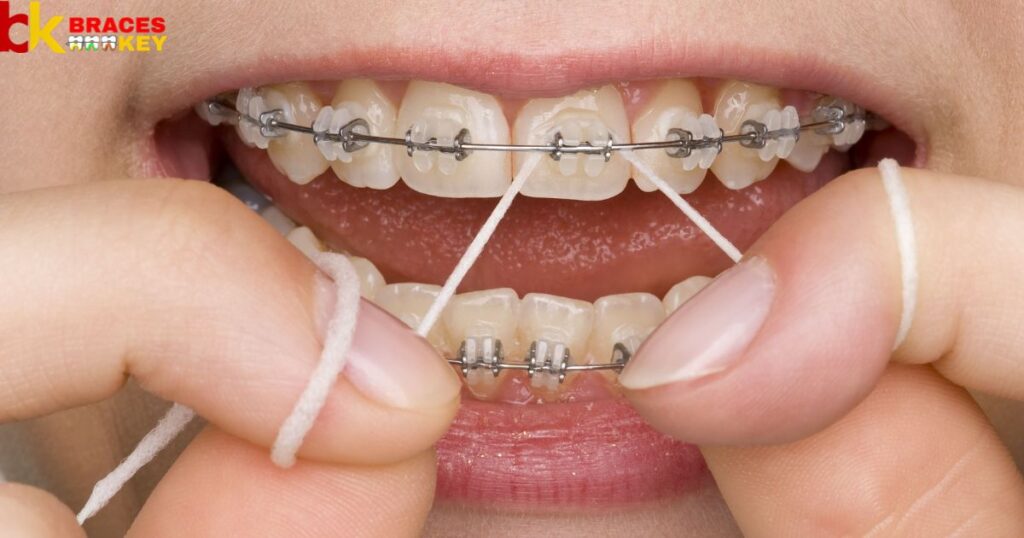
Managing cavities while wearing braces can be challenging due to the increased difficulty of cleaning teeth. It’s essential to maintain meticulous oral hygiene, including regular brushing, flossing, and using a water flosser to prevent plaque buildup around the brackets and wires.
Orthodontist’s Role in Cavity Management
Orthodontists play a crucial role in cavity management by ensuring proper alignment of teeth. When teeth are correctly positioned, it becomes easier to maintain oral hygiene, reducing the risk of cavities and gum disease. They work in tandem with dentists to create healthy and beautiful smiles while promoting overall dental well-being.
Cavity Treatment Options
Cavity treatment options typically involve removing the decayed tooth material and filling the cavity to restore tooth structure. Common methods include dental fillings, such as amalgam or composite resin, as well as more extensive treatments like dental crowns for severe cavities.
Dealing with a Cavity While Wearing Braces
Dealing with a cavity while wearing braces requires extra care and attention. The brackets and wires can make it challenging to clean teeth thoroughly, so regular dental check-ups are crucial. Your orthodontist can offer guidance on maintaining oral hygiene and may need to make adjustments to accommodate the cavity treatment.
Recognizing Cavity Symptoms
Recognizing cavity symptoms is crucial for maintaining good oral health. Common signs include tooth sensitivity, persistent toothaches, and visible pits or holes in the teeth. Regular dental check-ups can help detect and address cavities early, preventing more extensive dental problems.
Cavity Treatment Options with Braces
When undergoing orthodontic treatment with braces, managing cavities becomes essential. Patients can opt for various cavity treatment options, including fluoride applications to strengthen enamel, dental cleanings to prevent plaque buildup, and tooth-colored fillings for discreet repairs.
Preventing Future Cavities in Orthodontic Care
Preventing future cavities in orthodontic care is crucial for maintaining oral health during orthodontic treatment. Braces and other orthodontic appliances can trap food particles and make oral hygiene more challenging, increasing the risk of cavities.
FAQ’s
What happens if you get a cavity with braces?
If you develop a cavity while wearing braces, it can be more challenging to clean your teeth effectively, potentially leading to more significant dental issues.
Can cavities be prevented while wearing braces?
Yes, cavities can be prevented with diligent oral hygiene practices, including regular brushing, flossing, and dental check-ups, even with braces.
How can I maintain good oral health with braces to avoid cavities?
To maintain oral health while wearing braces, ensure thorough cleaning, limit sugary foods, and use fluoride products as recommended by your orthodontist.
What should I do if I suspect a cavity while having braces?
If you suspect a cavity, contact your orthodontist and dentist for a thorough examination and treatment recommendations to address the issue promptly.
Conclusion
In conclusion, facing the prospect of getting a cavity with braces, or Get A Cavity With Braces, can pose additional challenges and potential complications to your dental health. The presence of braces makes it more difficult to maintain proper oral hygiene, as food particles and plaque can easily become trapped around the braces and teeth. With vigilance and commitment, you can prevent cavities and other dental issues.
Regular and thorough brushing, flossing, and dental check-ups are crucial in this regard. It’s essential to follow your orthodontists and dentist’s recommendations for cleaning and dietary restrictions to mitigate the risk of cavities. If you do suspect a cavity related to “Get A Cavity With Braces, it’s imperative to address it promptly. Delaying treatment can lead to more severe dental problems. Overall, staying proactive in your oral care routine and seeking professional advice when needed will help you maintain good dental health even while undergoing orthodontic treatment with braces.
